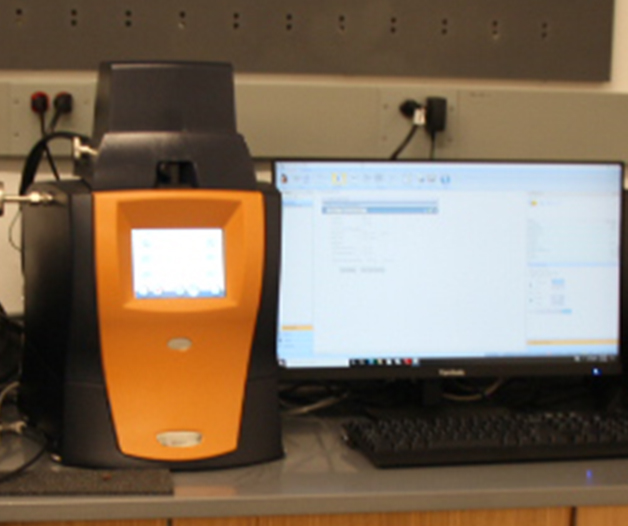
Available Methods and Accessories
- Has capability to operate in controlled force mode, controlled strain mode, and dynamic modes (e.g. multi-frequency and multi-temperature)
- Operates on different geometries (e.g. tension, compression, cantilever bending, shearing, and submersion tension)
Sample Requirements
- Single and Dual Cantilever: Evaluation of cure and all purpose,
- Sample size
- Single: 17.5 mm L, up to 15 mm W and 5 mm T,
- Dual: 35 mm L, up to 15 mm W and 5 mm T
- 3- Point bend: For medium to high modulus:
- Small: 20 mm W and 10 mm T
- Large: 50 mm L and 10 mm
- Tensions: Films : 8- 20 mm L, 5- 6.5 mm W and up to 2 mm T
- Shear Sandwich: Shear deformation of gels, viscous resins and adhesives: 10mm x 10 mm square of up to 4 mm thick
- Compression: low-medium modulus (foams), 15- or 40-mm diameter and up to 10 mm thick
Detection Limits
- Minimum Force 0.0001 N and Maximum 18N.
- Force Resolution 0.00001 N
- Modulus Precision ± 1% and Temperature Range -150 to 550 °C
- Frequency Range 0.01 to 200 Hz
- Heating Rate 0.1 to 20 °C/min
- Dynamic Sample Deformation Range ± 0.5 to 10 000 µm
Summary of Technique
- A Dynamic Mechanical Analyzer (DMA) measures elastic and viscous behavior of a material as a function of time and temperature.
- DMA works on the principle of applying a force or a deformation to a sample, then sample’s response, which will be a deformation, or a force is measured.
Information Provided & Detection Limits
- DMA provides quantitative measurements that reveal information about thermal transitions (e.g. glass transition, melting, order-disorder transitions of liquid crystalline materials), the stiffness of materials (e.g. storage, loss, and Young’s modulus), shape morphing properties (e.g. actuation and shape memory), dynamic bonding and self-healing properties, adhesion strength, and other material properties.
- It has very sensitive strain and force ranges that make it more suitable for the testing of soft materials (e.g. elastomers, gels, coatings, and foams) as well as precious materials with limited sample sizes.
Lab Location and Contact Information
Lab Location: Science 1 Research Center
Lab Manager: Dennis Ndaya
dennis.ndaya@uconn.edu
860-486-4075
Industrial Affiliates are encouraged to contact
IAP Director Paul Nahass paul.nahass@uconn.edu
or Assistant Director Hatice Bodugoz-Senturk Hatice.Bodugoz_Senturk@uconn.edu